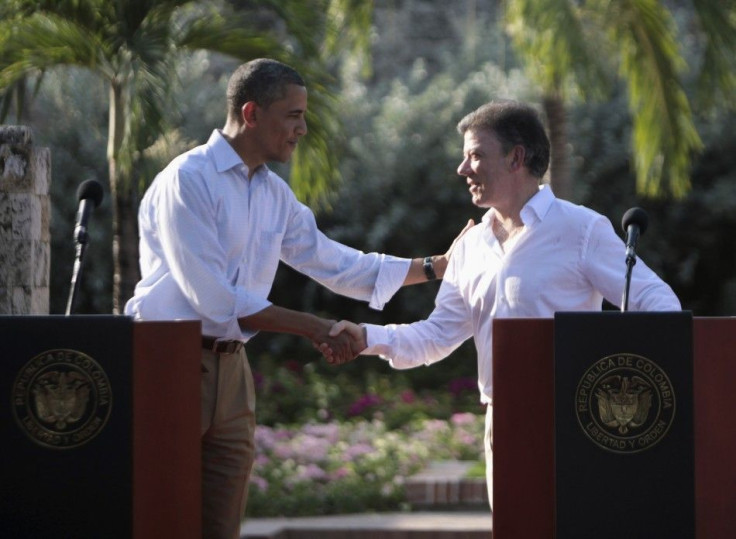Drug Policy Divides Obama, Latin American Leaders At Americas Summit

President Barack Obama faced pressure from Latin American leaders to reconsider America's enforcement-based approach to the war on drugs during a weekend summit Colombia.
Despite a decades-long effort to combat drug trafficking, consumption has continued to rise as violence related to the crackdown has convulsed Latin American nations like Mexico and Colombia. President Juan Manuel Santos of Colombia, the host of a Summit of the Americas held last weekend in Cartagena, Colombia, enlisted other leaders in pushing for a task force that could reconsider global drug policy.
I think the time has come to simply analyze if what we are doing is the best we could be doing, or if we can find an alternative that would be more effective and less costly to society, Santos said.
One extreme can be to put all users in prison, Santos added. On the other extreme, legalization. In the middle there may be more practical policies, such as decriminalizing consumption but putting all the efforts into interdiction.
President Obama called the discussion of drug policy good and useful, and although he reiterated that his administration remains opposed to legalization. The president also pledged an additional $130 million to bolster security and target drug cartels in Latin America.
I think it is entirely legitimate to have a conversation about whether the laws in place are doing more harm than good in certain places, Obama said.
Current Drug Policy: Underperforming On Several Fronts
Santos' call to re-examine drug policy reflects a rising chorus of current and past Latin American leaders who say a focus on arresting and punishing drug users has squandered resources and failed to stymie the flow of narcotics. In an op-ed written before the summit convened, President Otto Perez Molina of Guatemala suggested a globally regulated drug market with safeguards against abuse, such as prohibiting sales to minors and limiting mass advertising. He likened the current emphasis on criminalization to eradicating tobacco plantations as a means of halting cigarette use.
Decades of big arrests and the seizure of tons of drugs and yet consumption and production of damaging substances are booming. The fall in the consumption of one drug is rapidly undermined by the rise in demand for another, Molina wrote. We cannot eradicate global drug markets, but we can certainly regulate them as we have done with alcohol and tobacco market, he added.
Officials argue that the issue has become highly politicized, with social stigmas against drug use leading governments to focus on punishing users rather than offering treatment and rehabilitation services.
We just do not know until we have the data, investigate every option with open minds, and have the full picture drawn up by experts who know the terrain, and are not motivated by interests, ideology or emotion, Mauricio Rodríguez, an aide to president Santos and ambassador to London, told the Guardian. He added that the newly announced group of experts would look at the social issues, the reasons why people take drugs: poverty, social breakdown, abuse and dysfunction.
A trio of former Latin American presidents have become vocal proponents of decriminalization, writing in an op-ed that the war on drugs has had devastating consequences and advocating some form of legal regulation of drugs. Former presidents Cesar Gaviria of Colombia, Ernesto Zedillo of Mexico and Fernando Henrique Cardoso of Brazil -- all of whom work for the Global Commission on Drug Policy -- argued that criminalization has allowed violent cartels to flourish.
Regulation cuts the link between traffickers and consumers, the former presidents wrote. It is this link that enables traffickers to impel people to use ever more harmful drugs.
--
© Copyright IBTimes 2025. All rights reserved.





















